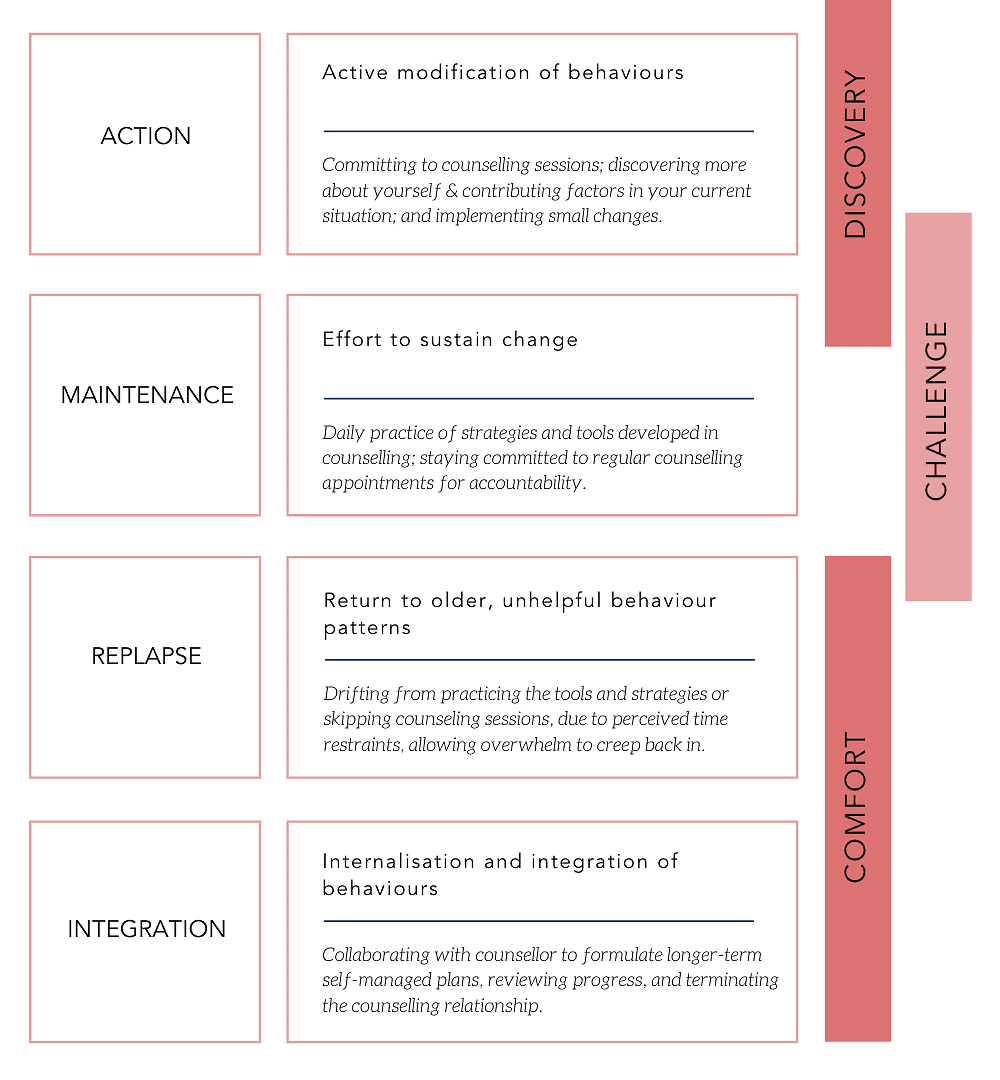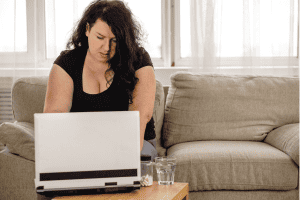Why is it so hard to change things?
You know things are tough right now. In fact, they’ve been tough for a while. So you know that something has to give. Something has to change, but you’ve tried it before and you’re back to where you started. Maybe it’s setting boundaries with family members, or pushing yourself to try new things to make friends, or you’ve been trying to embed new practices to manage anxiety, or you’re trying to drink more water, or you’re trying to stay committed to attending counselling! But somehow, you keep ending up back where you start… wanting things to change.
Behaviour change is complicated and complex because it requires a person to disrupt a current way of living, while simultaneously fostering a new, possibly unfamiliar, set of actions. Your current way of living is familiar, you know it well, it keeps you safe in that you know what comes next. But that’s doesn’t mean it’s good for you. Introducing change takes you into unfamiliar waters, so it’s natural for you to be drawn back to what you know well.
Understanding the behaviour change process, or the Cycle of Change, can help you to identify what stage of change you are in, recognise the emotions and reactions that accompany that stage, tailor the actions that you need to undertake in that stage, and empower you to stay true to the changes you seek until they are firmly embedded in your way of living.
I’ll explain this cycle in detail below, using an example to illustrate each stage.

Pre-contemplation
The pre-contemplation stage sits at the beginning of the cycle. In this stage we are generally unaware of any need to change, and have no consideration of changing. Let’s take a look at the example of making the decision to gain support in managing overwhelming anxiety. In the pre-contemplation stage you may have no awareness of the need for support. “What anxiety? I’m just really busy right now with the XYZ… it’ll get easier.”
This stage feels comfortable and safe, it’s what we’ve done before and what we know how to do well. In this example, perhaps dismissing your needs, or ignoring your situation is how you’ve always coped and you know no other way.
Contemplation
The contemplation stage is a state of ambivalence, thinking about change, reviewing pros and cons of change.
“I’m feeling really overwhelmed and anxious all the time. Maybe I need some help. But I don’t have time right now, or the money… it’ll get easier.” This is where the discomfort starts to set in as we become aware that something needs to give, but the idea of it is pushing against our safety into new territory. Fear and resistance can kick in here, and in this example this fear and resistance can manifest in the form of reasons for not seeking help… financial, time, guilt, shame.
Preparation
The Preparation stage involves planning to change, taking steps to facilitate change behavior. Here we can see the change that is needed and we plan for making it. We finding resources and take the steps needed. “Okay, this isn’t getting easier. This is getting too much and I’m not coping. I’m going to find a counselor, organize a sitter, and book myself in for next week.” This stage often comes with a mix of emotions and discomfort, additional anxiety at the unknown ahead, but also anticipation that support and change are in sight.
Action
Actively modifying behaviours by putting plans into practice. In our example, committing to the process of therapy with attendance of sessions; delving into discovering more about yourself and contributing factors in your current situation; education about the anxiety you’re experiencing; and implementing small changes you’ve developed with your therapist. Discovery and insight can cause discomfort, but also anticipation at the possibility of reducing your anxiety levels. You can’t get change without change.
Maintenance
In this stage we work to make the behaviours we’ve learned become part of daily life. The tools and strategies you’ve learned become habitual, replacing old coping mechanisms. We become resourceful to implement these strategies, and remain focused on what we’re achieving. In our example, daily practice of mindfulness and breathing for emotional regulation may be something developed with your therapist, so that becomes a part of your daily routine in conjunction with other strategies. Staying committed to regular counseling appointments assists in reviewing these and staying accountable. This stage provides challenge for many.
From here, one of two routes may ensue, relapse or integration.
Relapse
Here we return to older, unhelpful behavior patterns. We fall back in to what is comfortable and what was originally safe for us. This may happen slowly over time, leading to confusion. In our example, we may drift from practicing the tools we’ve developed, or begin skipping counseling sessions, due to perceived time restraints, allowing anxiety and overwhelm to creep back in.
Integration
Integration is the other path, where we push through the challenge of the Maintenance stage, and fully integrate and internalize the changes we’ve implemented. This may involve collaborating with your counselor to formulate longer-term plans, or terminating the counseling relationship.
It’s important to note that it’s common and normal to move to and fro between the stages of action, maintenance and relapse as you work toward integration. It’s what happens in that instance that is integral to long-term change.
When a setback occurs, it’s valuable to acknowledge the lapse as part of the change process and treat the event as a learning opportunity to discover more about your situation. Review what happened and the circumstances surrounding it; the feelings and emotions involved; and was learned in regard to what needs to happen next to get back on track to move you toward integration and long-term change.

Being able to identify where you are currently in the Cycle of Change can help you to go gently with yourself in the understanding that change doesn’t happen overnight. It can help you identify the emotions and feelings that are sitting with you so that you can normalise them as a progress in your movement toward change, and remain focused on your goals.
My name is Fiona Rogerson and I am an ACA accredited Perinatal and Trauma Counsellor, and Hypnobirthing (Mongan Method) Educator. I work with women and men to overcome emotional and psychological hurdles surrounding conception, pregnancy, postpartum, parenting and identity. I am also available to provide professional development training and workshops to various organisations. I am based south of the river in Perth, working across two location or via zoom for remote clients, and can be contacted by email at fiona@fionarogerson.com.au or phone 0402 017 425 or via my contact page. Find me on Facebook and Instagram.















